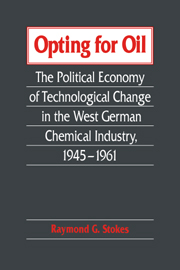Book contents
- Frontmatter
- Contents
- Preface
- Introduction
- Part I Background
- Part II Bargaining from strength: the political economy of technological change, 1949–1955
- 3 A new agenda, 1949–1955: Cold War, changing energy patterns, and the development of West German chemical technology
- 4 Rejoining the international community: international cooperation and technology transfer, 1951–1955
- Part III Alternative paths to plenty: case studies from the mid–1950s
- Part IV Consolidating the new regime, 1957–1961
- Index
4 - Rejoining the international community: international cooperation and technology transfer, 1951–1955
Published online by Cambridge University Press: 19 October 2009
- Frontmatter
- Contents
- Preface
- Introduction
- Part I Background
- Part II Bargaining from strength: the political economy of technological change, 1949–1955
- 3 A new agenda, 1949–1955: Cold War, changing energy patterns, and the development of West German chemical technology
- 4 Rejoining the international community: international cooperation and technology transfer, 1951–1955
- Part III Alternative paths to plenty: case studies from the mid–1950s
- Part IV Consolidating the new regime, 1957–1961
- Index
Summary
The broad postwar changes that affected the place of the West German organic chemical industry in the political economy of the Western world, as described in Chapter 3, facilitated – and in part were facilitated by – the events to be described in this chapter: The return of German firms to respected and active membership in the international business community was, of course, a function of the re-achievement of sovereignty by the Federal Republic, but the economic performance engendered in part by rejoining the international community helped stabilize and increase the power of the West German state.
This chapter deals primarily with patterns of technology transfer in the first half of the 1950s, although it explores some other forms of international cooperation as well. Because this material has the potential for such a wide range of ramifications, its treatment will be limited in several ways. The chapter concentrates, for instance, on relationships between German firms and their counterparts in the United States and, to a lesser degree, Great Britain, which were by far the most important foreign economic relations for the postwar chemical industry (and most other industries). This story involves, furthermore, only a small number of West German firms, mostly BASF and Bayer, with some attention to Hoechst A.G. and to Professor Karl Ziegler and his low-pressure process for producing polyethylene.
- Type
- Chapter
- Information
- Opting for OilThe Political Economy of Technological Change in the West German Industry, 1945–1961, pp. 109 - 130Publisher: Cambridge University PressPrint publication year: 1994



